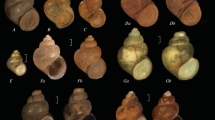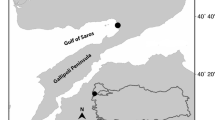Abstract
THE phenomenon of parasitic castration has been reported in many of the animal phyla including the Mollusca1–4. Investigations into the biology and ecology of scallops in Port Phillip Bay, Victoria, have revealed an interesting example of parasitic castration in Pecten alba.
Similar content being viewed by others

References
Von Brand, T., Chemical Physiology of Endoparasitic Animals (Academic Press, New York, 1952).
Caullery, M., Parasitism and Symbiosis (Sidgwick and Jackson, Ltd., London, 1952).
Charniaux-Cotton, Helen, The Physiology of Crustacea, 1, 411 (Academic Press, New York, 1960).
Nicol, J. A. C., The Biology of Marine Animals (Pitman Press, London, 1960).
Mason, J., J. Mar. Biol. Assoc. U.K., 37, 653 (1958).
Harrison, A. J., thesis, Univ. Tasmania (1961).
Author information
Authors and Affiliations
Rights and permissions
About this article
Cite this article
SANDERS, M. Parasitic Castration of the Scallop Pecten alba (Tate) by a Bucephalid Trematode. Nature 212, 307–308 (1966). https://doi.org/10.1038/212307b0
Issue Date:
DOI: https://doi.org/10.1038/212307b0
- Springer Nature Limited




